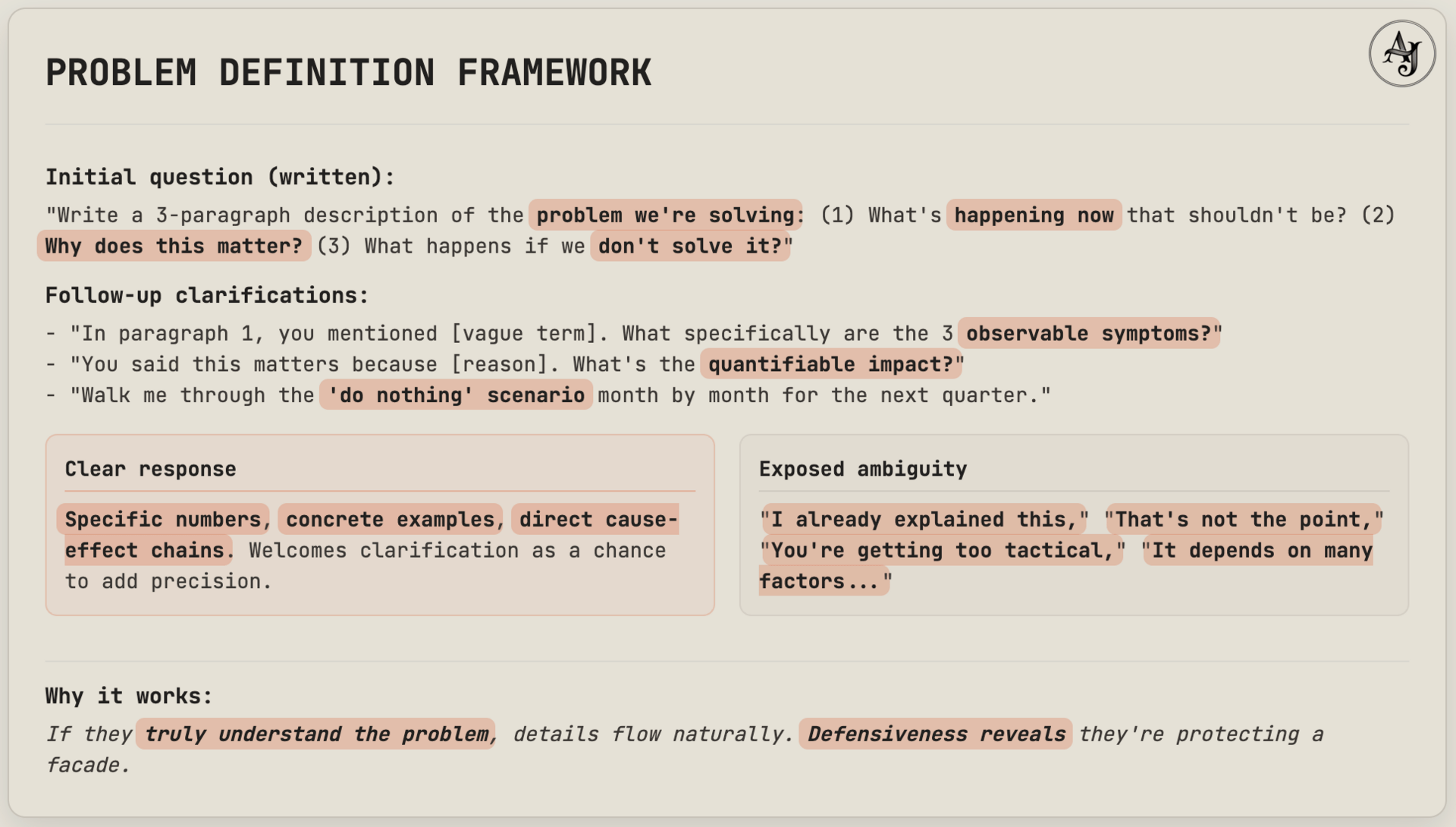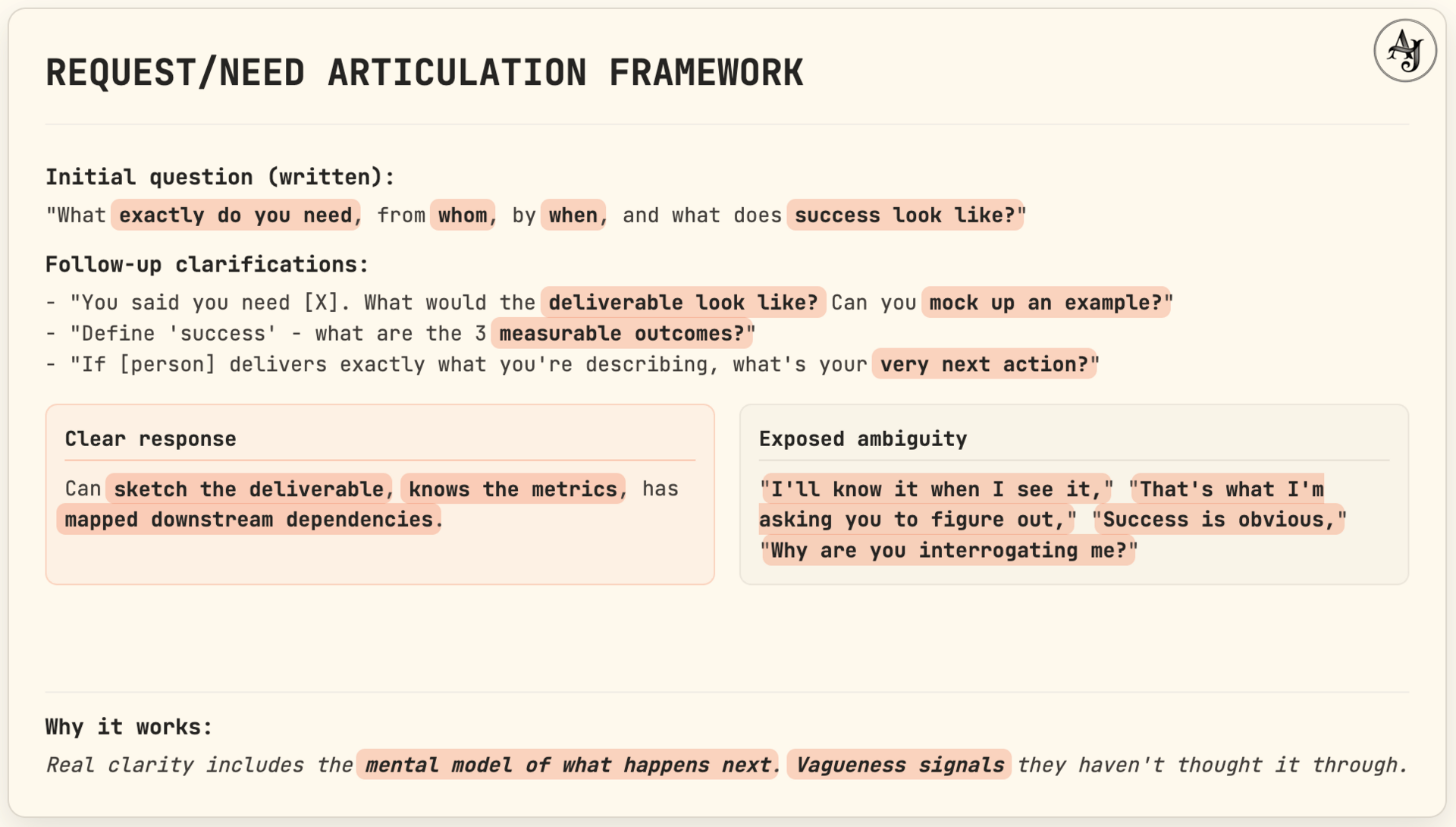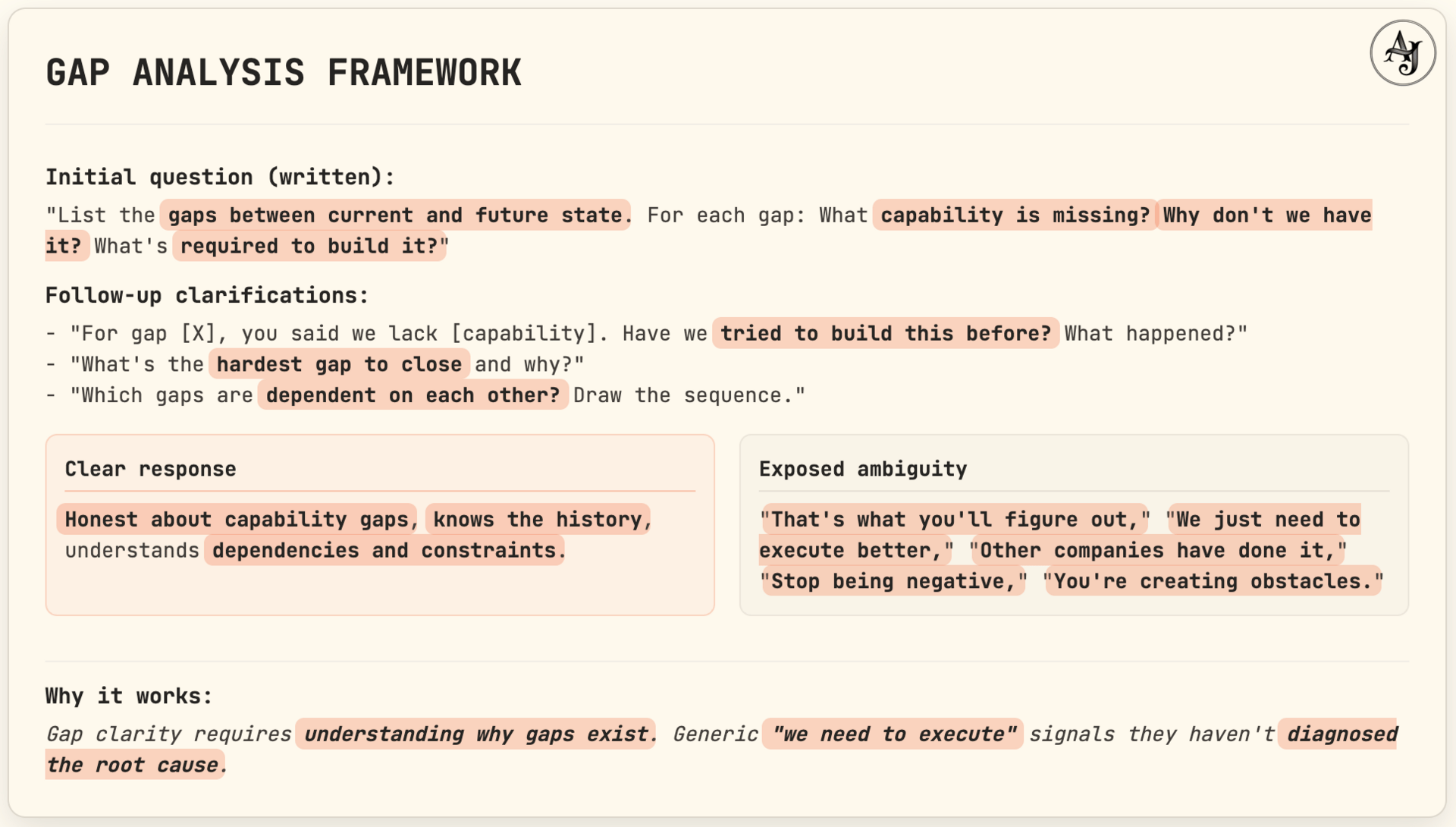I've noticed something that once you see it, you can't unsee it.
Some people can tell you exactly what they need. Not what they want, not what would be nice to have: what they need. They can describe where they are, where they're going, and what's in the way. When you ask them to clarify, they get more specific. They welcome the precision.
Others... can't. Or won't. And here's the thing: one question tells you which category someone falls into, faster than weeks of working together.
The pattern
You know that person who sends vague requests? "We need to improve the product experience." "Let's optimize our funnel." "We should be more data-driven."
Ask them to be specific. Watch what happens.
If they have clarity, they'll say something like: "Our checkout abandonment is 47%. Industry average is 28%. We're losing $230K/month because the payment form doesn't autofill on mobile Safari. I need a developer to fix the autofill integration by end of Q1."
If they don't have clarity—or worse, if they're hiding behind vagueness—you'll get defensiveness:
"I already explained this"
"You're overthinking it"
"That's what I'm asking you to figure out"
"Why are you interrogating me?"
That defensive reaction? That's the tell. It reveals someone who claimed knowledge they don't have, made requests they can't articulate, suggested solutions to problems they haven't diagnosed.
Why this matters more than you think
The difference isn't just communication style. It's not about being a "big picture person" versus "detail-oriented."
Clarity is a direct function of knowledge and awareness.
To be unambiguously clear about what you need, you must understand:
Current state (where we are)
Future state (where we're going)
The gaps (what's missing)
If you can't articulate these, you don't understand the problem. And if you don't understand the problem, everything downstream is built on sand.
Here's what most people miss: clarity on the problem is 100x more valuable than clarity on the solution.
I'd rather work with someone who says "I'm crystal clear that our checkout is broken—47% abandonment, $230K/month loss, mobile Safari issue—but I'm not sure if we need a dev fix or a redesign" than someone who says "We definitely need to rebuild the checkout in React" without being able to explain why.
One knows what's broken. The other is guessing at solutions.
Clarity doesn't mean certainty
This isn't about having all the answers. Some of the clearest people I know say "I don't know" constantly.
The difference is how they say it:
Vague uncertainty: "We need to improve metrics."
Clear uncertainty: "Our activation rate is 22%. I don't know if that's good or bad. I don't know which metric drives retention most. I need to run three analyses this week: cohort behavior, feature correlation, and competitive benchmarks. Then I'll know what to optimize."
See the difference? The second person is unambiguously clear about what they don't know. They've mapped the knowledge gaps. They know what questions to answer.
The diagnostic questions
Here's how to test for real clarity. These work whether you're managing down, collaborating with peers, or managing up. The secret? Ask for it in writing.
Writing clarifies thinking like nothing else. You can hide behind vague speaking. You can't hide in writing.
1. Problem definition

2. Request articulation

3. Gap analysis

Here's what makes this insidious: genuine ambiguity is fine. Clarity disguised as ambiguity is cancer.
When someone genuinely doesn't know, you can help them figure it out. Build the knowledge together. That's productive ambiguity.
But when someone has the knowledge and clarity but presents ambiguity? When they hedge to avoid accountability, stay vague to create wiggle room, hide behind "it depends" when they know exactly what they mean?
That's a choice. And that choice has a cost:
Teams spin on undefined problems
Resources pour into wrong solutions
Timelines stretch because no one knows what "done" means
Conflicts emerge because everyone interpreted the vague request differently
Trust erodes because the ambiguity feels like manipulation
The person might be protecting themselves, but they're taxing everyone else.
What to do about it
If you manage someone who can't or won't be clear:
First, test if it's "can't" or "won't." Use the diagnostic questions. If they're genuinely trying to be specific and struggling, you're building their capability. If they're defensive and evasive, you're dealing with a different problem.
Second, make the cost visible. "When you said 'improve the product,' the team interpreted it four different ways. We lost two weeks. What specifically should we improve?"
Third, require writing. Verbal vagueness evaporates in written form. "Send me a one-pager on what you need."
If you're working with a peer or managing up:
Frame it as collaboration: "To make sure I'm aligned with your thinking, can you help me understand what the 3 observable symptoms of this problem are?"
Or frame it as execution clarity: "To make sure I deliver exactly what you need, can you mock up what the final deliverable looks like?"
The pattern is the same: ask for specificity, watch the reaction, adjust accordingly.
The key test
Here's what I've learned: the ability to be unambiguously clear about what you need is the single most reliable indicator of whether someone knows what they're talking about.
It cuts through titles, experience, charisma, confidence. It reveals who's done the thinking and who's performing the appearance of having done the thinking.
One question. One written response. One request for clarification.
That's all it takes.
The people who get more specific when asked? They're the ones who've mapped the terrain. They know where they are, where they're going, what's in the way.
The people who get defensive? They're protecting the gap between what they claimed to know and what they actually know.
You can spot it in every interaction once you know the pattern. Team meetings, project kickoffs, strategy sessions, one-on-ones. Someone makes a claim, you ask for precision, and everything reveals itself in the response.
Try it this week. When someone makes a vague request or claim, ask them to be specific. Not to challenge them—to understand them.
Watch what happens.
The ones with clarity will thank you for helping them be more precise.
The ones without it... well, now you know.
What's your experience with this? Hit reply—I read every response.
